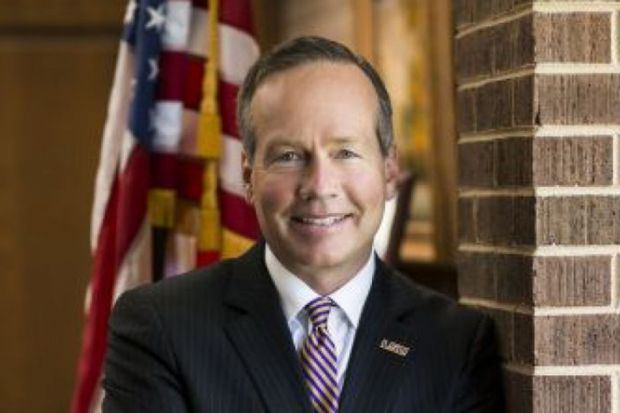State legislatures should be required to match federal funding for higher education in order to help tackle the US’ student debt crisis, a university president has said.
F. King Alexander, head of Louisiana State University, said federal policymakers have been devising massive grant and loan programmes to help students with the cost of university study for decades, long before the current debate among presidential candidates about “free college”.
At the same time, however, states have responded by cutting their own investments in higher education, happy to have the budgetary relief.
It has reached the point where US states, on a per capita basis, are providing as much funding to higher education as they were in 1965.
While Alaska might now be the most extreme example – slashing its support for higher education by 41 per cent this year alone – it is just one among several states on pace to completely eliminate such spending within a few years.
“It’s clear that states are getting out of the funding of higher education,” Dr Alexander told Times Higher Education.
The solution for federal policymakers, he suggested, seems relatively straightforward: stop giving states money without insisting that they provide something in return.
Otherwise, Dr Alexander said, universities will continue to watch Congress take hard votes on actions such as increasing the Pell Grant, the main federal subsidy for low-income students, only to wince as their state legislatures make a corresponding pullback in institutional funding.
“What good does it do if we put $250 [£206] into a Pell Grant, when the states cut our budget and I’ve got to raise tuition by $495?” asked Dr Alexander.
His solution is a well-established tactic in federal-state relations. Rather than simply boost aid to students, as many of the presidential candidates are suggesting, Dr Alexander advocated a model used in highway construction, healthcare, elementary education and more – for every extra dollar a state invests in its colleges, the federal government would match it.
That idea does exist in higher education, but at levels far too low to make a meaningful difference, Dr Alexander said. And his suggestion of making it a much more substantial factor in federal support for higher education has met strong opposition.
Key sceptics, he said, include Lamar Alexander, a Republican US senator and former state governor and ex-president of the University of Tennessee. He chairs the Senate’s education committee and feels that such federal coercion would unfairly challenge the right of states to make their own funding decisions.
More disappointing, Dr Alexander said, was the apparent reluctance of many other public university leaders across the US to join him in clearly pointing out the ways in which their states are withdrawing from their traditional role as a funder of higher education.
Many agree that the federal government should do more to “incentivise better decisions on the part of state legislatures and governors”, but they are less willing to press the point publicly, he said. “They’re like, “This is great, good luck.’”
The funding crisis also suggests that a large share of the older US population who enjoyed publicly funded university study are now reluctant to give the support necessary to allow other generations the same benefit, Dr Alexander said.
“Really, it’s the baby boomers getting out of their responsibility to fund public higher education for the next generation of students,” he said, “and shifting that burden to the students of that generation.”
Register to continue
Why register?
- Registration is free and only takes a moment
- Once registered, you can read 3 articles a month
- Sign up for our newsletter
Subscribe
Or subscribe for unlimited access to:
- Unlimited access to news, views, insights & reviews
- Digital editions
- Digital access to THE’s university and college rankings analysis
Already registered or a current subscriber?







